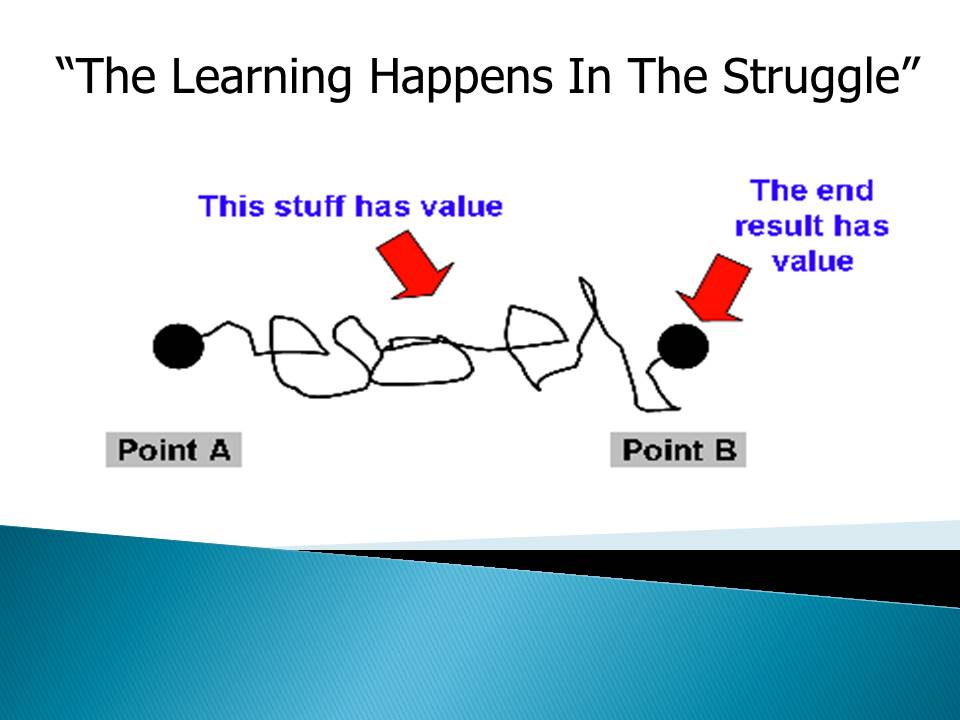 I’m a bad person.
I’m a bad person.
I’m an idealist with little use for idealists. It’s not personal. I like those I actually know. But their articles, and books, and speeches make me want to break things and yell school-inappropriate things.
I resent speakers and writers who build their reputations on explaining how amazing children are and could be if these damn teachers would just get out of the way. I’m sure they’re nice people, smarter and probably better traveled than myself. It’s just that what starts as a neat isolated experience becomes a TED Talk, then a doctrine, then a Pink Floyd cover band.
“Hey, teachers! Leave those kids alone!”
 Don’t get me wrong – it’s just peachy keen swell that throwing a few computers in the middle of an impoverished village and making sure no teachers interfere practically guarantees a bunch of eight-year olds will master calculus, cure cancer, and reverse climate change. Here’s to the success of every one of those dusty darlings and even newer, bigger opportunities for them to challenge themselves AND the dominant paradigm. Seriously.
Don’t get me wrong – it’s just peachy keen swell that throwing a few computers in the middle of an impoverished village and making sure no teachers interfere practically guarantees a bunch of eight-year olds will master calculus, cure cancer, and reverse climate change. Here’s to the success of every one of those dusty darlings and even newer, bigger opportunities for them to challenge themselves AND the dominant paradigm. Seriously.
Variations of this theme abound on Twitter, the blogosphere, and administrators’ bookshelves. Hand any teenager an iPad and stop crushing his little spirit with your outdated ways and he’ll learn like the wind. Enough, you fiend – let them love learning!
But I don’t buy it. Not even a little.
I can’t point to research or books with provocative edu-titles. If you really want me to, I’ll try it – I’ll lock my students in my classroom with the two relatively outdated computers available there and come back in May to release them.
 Maybe it would be better to do the entire building… eleven hundred freshmen set free to learn with a bank of Dells and no silly adults with their stifling expectations. Imagine the money saved on staff – and computers never take personal days or violate professional dress code!
Maybe it would be better to do the entire building… eleven hundred freshmen set free to learn with a bank of Dells and no silly adults with their stifling expectations. Imagine the money saved on staff – and computers never take personal days or violate professional dress code!
Forgive me if I don’t anticipate an education revolution as a result.
My bet is something more akin to Lord of the Flies, although I could be WAY off – it could be more Hunger Games or Clockwork Orange-y. I’m not prescient, I’ve just met teenagers.
It probably doesn’t help that my students have so much else they could do instead of take a self-directed learning journey of personal discovery. The kids in the inspirational anecdotes don’t tend to have an Xboxes, smart phones, cable TV, malls, or meals which include protein.
Remember how entertained you now think you were as a kid with just a cardboard box and some Cheez Whiz for a whole afternoon? That was great, mostly because you had ABSOLUTLEY NOTHING ELSE TO DO. Teeter totters are awesome compared to staring at dirt; they lose some magic compared to Halo: The Arousing. It’s just all so relative. In the land of rotary dialers, he with the Atari is king.
But only there.
 I’m not unsympathetic. I get what these writers and speakers are going for. Most are trying to make the very valid point that when we try to cram kids’ heads full of 87-pages of curriculum standards compiled by committees and approved by states to be tested by bubbles, we are unlikely to either fill their buckets OR light their fires.
I’m not unsympathetic. I get what these writers and speakers are going for. Most are trying to make the very valid point that when we try to cram kids’ heads full of 87-pages of curriculum standards compiled by committees and approved by states to be tested by bubbles, we are unlikely to either fill their buckets OR light their fires.
Our American spawn resist being cajoled into dronehood – which is largely what public ed does and is designed to do. We do try these days to at least beat them into more CURRENT drone models… it’s just that things in the real world keep changing so fast…
But… technology! ALL LEARNING CAN BE GRAND MATH AUTO!
I’m not against online coursework. I know for a fact that it serves a useful function for certain kinds of students in specific situations. But let’s keep a little perspective.
We’re swept up in the promise of ‘individualized pacing’, intense engagement, and infinite branches of exploration – like the Holodeck or those Divergent serums. One would think educational software must be on the verge of surpassing the major video gaming companies in terms of graphics, storylines, and immersion. (Watch out Elder Scrolls VII – here comes Bioshock Civics: How the Powers of the Executive Branch Have Evolved Commensurate to Expansions in Mass Media!)
 It’s not. Remember that Oregon Trail game we were all so excited about a few decades ago? That’s still about as cutting edge as educational games have managed, and that’s not even what most virtual learning is attempting.
It’s not. Remember that Oregon Trail game we were all so excited about a few decades ago? That’s still about as cutting edge as educational games have managed, and that’s not even what most virtual learning is attempting.
The vast majority of online coursework consists of reading short passages, watching videos, following a few links, then answering multiple choice questions. There may be a little writing. You work alone, and guess at the multiple choice questions as often as necessary to hit 75% or whatever before you move on.
This pedagogy is everything we’ve been fighting against since Horace Mann. Nothing wrong with utilizing textbooks or lectures or video, but a teacher whose class is driven by such things is unlikely to win a Bammy.
To be fair, the more cutting-edge programs let you email your teacher or make a few lame required posts to a ‘discussion group’ from time to time. Truly this is leaps and bounds beyond my foldables or a good Socratic circle, but Fallout: Populism it is not.
Most learning happens because teachers in rooms keep trying to figure out how to inspire, motivate, cajole, or trick their darlings into learning things the teacher thinks are important even though the 11-year old may not realize it just yet.
 There are glaring problems with this system, some within the school’s control and many more without. The biggest problem with the current model is also the most substantial barrier to all this self-directed learning we keep hearing will save us all – state legislatures dictate most of what’s supposed to be “important” and decide how these things will be assessed.
There are glaring problems with this system, some within the school’s control and many more without. The biggest problem with the current model is also the most substantial barrier to all this self-directed learning we keep hearing will save us all – state legislatures dictate most of what’s supposed to be “important” and decide how these things will be assessed.
But the absurdity of rigid state mandates doesn’t mean the logical solution is to eliminate all adult guidance regarding essential knowledge or skills. Crazy as it may sound, many good teachers are perfectly capable of finding balances based on the abilities and interests of their kids – some non-negotiables, because hopefully the certified professional knows a few things the pre-teen does not, and some choice for the child regarding what they pursue and how they pursue it.
And if that doesn’t work, we can go back to your plan. But I’m not cleaning up after the pig head on a stick.
Related Post: Teach A Kid to Fish
Related Post: A School of Reindeer


 Introducing… Courtney. Of course her name wasn’t really Courtney, but for purposes of this blog she’s Courtney. Her real name was Alisha, but I’d never use it – it would be unprofessional.**
Introducing… Courtney. Of course her name wasn’t really Courtney, but for purposes of this blog she’s Courtney. Her real name was Alisha, but I’d never use it – it would be unprofessional.** I was young enough to still cling to a FEW ideals and principles – should I give in so easily when I didn’t think it was best for classroom dynamics and expectations, best for me, or even best for Courtney? Did we want to teach her that sufficient complaining could solve any problem?
I was young enough to still cling to a FEW ideals and principles – should I give in so easily when I didn’t think it was best for classroom dynamics and expectations, best for me, or even best for Courtney? Did we want to teach her that sufficient complaining could solve any problem? What mattered was the fight. Going down gloriously. Holding the pass for as long as you might, no matter the cost. Standing in the gap full of idealistic defiance for as long as you can before you are inevitably overrun.
What mattered was the fight. Going down gloriously. Holding the pass for as long as you might, no matter the cost. Standing in the gap full of idealistic defiance for as long as you can before you are inevitably overrun. The bureaucrats have more bullsh*t than we have shovels, and the hordes of ignorance are legion. Those who are with us are far, far fewer than those who are against us, and whether you use Common Core math or give up and figure it the old way, we are totally and completely screwed.
The bureaucrats have more bullsh*t than we have shovels, and the hordes of ignorance are legion. Those who are with us are far, far fewer than those who are against us, and whether you use Common Core math or give up and figure it the old way, we are totally and completely screwed. But try, just for a moment, to taste the glory of wildly doing what you do best without recourse to future progress or past circumstances. Imagine knowing you’re not alone, and that if you’re going down, you’re going down doing all you know how to do – insufficiently, to be sure, but leaving it all in the fields.
But try, just for a moment, to taste the glory of wildly doing what you do best without recourse to future progress or past circumstances. Imagine knowing you’re not alone, and that if you’re going down, you’re going down doing all you know how to do – insufficiently, to be sure, but leaving it all in the fields. I forget sometimes how fortunate I am to be in a building where my various superiors pretty much want the same things I do. I’m given a fairly accurate idea up front of what they will and won’t defend me for doing, and it’s not so far from what I’d reasonably hope.
I forget sometimes how fortunate I am to be in a building where my various superiors pretty much want the same things I do. I’m given a fairly accurate idea up front of what they will and won’t defend me for doing, and it’s not so far from what I’d reasonably hope. I’m neither Catholic nor anti-Catholic, and my message here is not a particularly theological one. But you gotta admit, there’s something appealing about the idea of one faith, one authority, one source of rules – and a clear, solitary source of redemption. One place to go if you need a meal, a message, or social mores. Every ritual at every step – birth, marriage, death, and beyond – coordinated and structured for you. Enough room to be yourself, but not so very much room that one’s “self” could stray far enough to get into any real trouble.
I’m neither Catholic nor anti-Catholic, and my message here is not a particularly theological one. But you gotta admit, there’s something appealing about the idea of one faith, one authority, one source of rules – and a clear, solitary source of redemption. One place to go if you need a meal, a message, or social mores. Every ritual at every step – birth, marriage, death, and beyond – coordinated and structured for you. Enough room to be yourself, but not so very much room that one’s “self” could stray far enough to get into any real trouble. The traditional Catholic Church did something better than most when it came to confession. They formalized it and structured it so that the old was drained before the new began. The confessional allowed complete emptying of sins and the shortcomings. Just as significantly, the penitent were given acts of contrition to perform. Contrary to caricature, these were not the cleansing themselves, but symbols for the penitent to give them something tangible – some ‘buy in’ – in order to solidify their absolution. The forgiveness meant more and felt more real if the sinner could DO something to demonstrate their change of heart. The confessional, the assigned acts, the beads and even the collar – they’re scaffolds for the intangibles in play. They’re props in the most literal sense – holding up the parts we can’t see.
The traditional Catholic Church did something better than most when it came to confession. They formalized it and structured it so that the old was drained before the new began. The confessional allowed complete emptying of sins and the shortcomings. Just as significantly, the penitent were given acts of contrition to perform. Contrary to caricature, these were not the cleansing themselves, but symbols for the penitent to give them something tangible – some ‘buy in’ – in order to solidify their absolution. The forgiveness meant more and felt more real if the sinner could DO something to demonstrate their change of heart. The confessional, the assigned acts, the beads and even the collar – they’re scaffolds for the intangibles in play. They’re props in the most literal sense – holding up the parts we can’t see. Confess your shortcomings – real or perceived – and accept absolution. This is not mockery of faith; it’s appropriation of a principle powerful enough to extend past the spiritual realm. Sit with someone you trust and say them out loud. If you can’t, email them to me. I won’t tell unless you become REALLY famous someday and have something to gain by it. I swear.
Confess your shortcomings – real or perceived – and accept absolution. This is not mockery of faith; it’s appropriation of a principle powerful enough to extend past the spiritual realm. Sit with someone you trust and say them out loud. If you can’t, email them to me. I won’t tell unless you become REALLY famous someday and have something to gain by it. I swear. I absolve thee of that horrible video you didn’t really preview but that one teacher said was pretty good. It definitely has to go. You kinda suspected, but… you didn’t know. You are absolved.
I absolve thee of that horrible video you didn’t really preview but that one teacher said was pretty good. It definitely has to go. You kinda suspected, but… you didn’t know. You are absolved. Take that hour before bed to have a family, or watch that show, or do those aerobics you keep meaning to do in the morning but just… can’t. See those friends, have that drink, and speak more positives than negatives about your job, your peers, and especially your kids.
Take that hour before bed to have a family, or watch that show, or do those aerobics you keep meaning to do in the morning but just… can’t. See those friends, have that drink, and speak more positives than negatives about your job, your peers, and especially your kids.